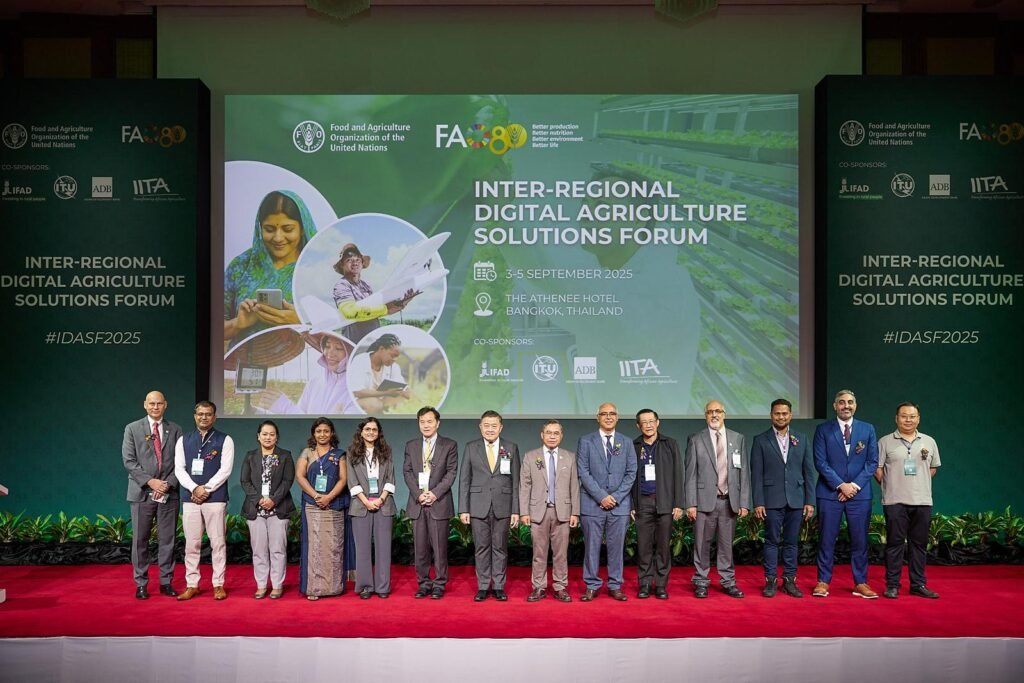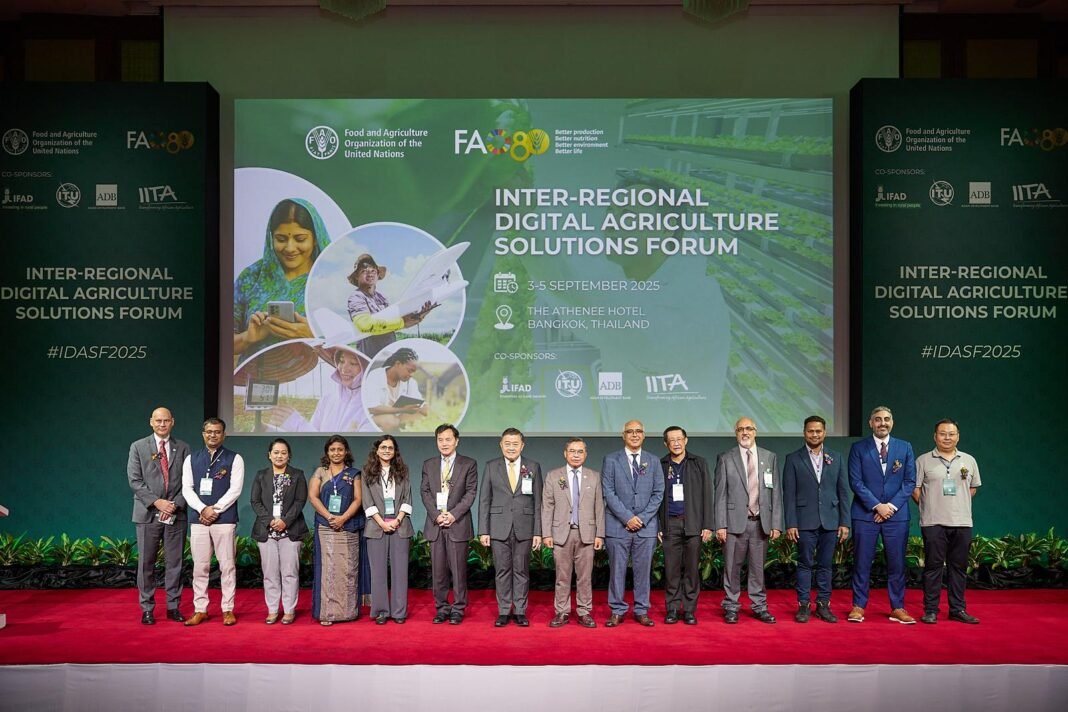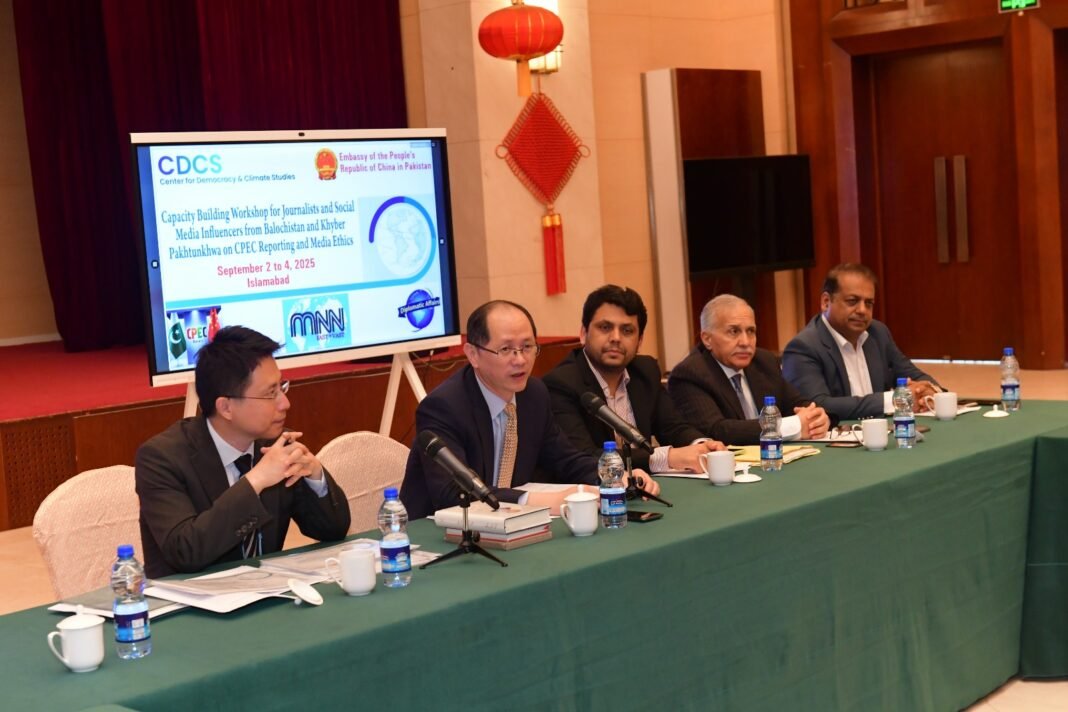
Bangkok talks boost digital shift for farmers, sustainable agrifood, Experts
Bangkok : – Digital agriculture is transforming how food is produced, managed, and delivered, offering powerful tools to tackle climate change, strengthen food security, and build more resilient and sustainable agrifood systems. Across regions, governments, innovators, researchers, and farmers are increasingly using artificial intelligence (AI), mobile platforms, satellite data, and digital advisory services to drive change.
To exchange experiences, showcase innovations, and explore ways to expand the impact of digital agriculture across the region, the Food and Agriculture Organization of the United Nations (FAO) Regional Office for Asia and the Pacific organized the Inter-Regional Digital Agriculture Solutions Forum 2025 (IDASF 2025), with support from the Asian Development Bank (ADB), the International Fund for Agricultural Development (IFAD), the International Telecommunication Union (ITU), and the International Institute of Tropical Agriculture (IITA), from 3 to 5 September 2025 in a hybrid format in Bangkok. The Forum brought together nearly 400 participants from over 50 countries, including government leaders, development practitioners, and cutting-edge innovators.
“Digitalization is no longer optional in agriculture. It is a powerful tool to tackle hunger, reduce emissions, and help smallholder farmers and rural communities thrive. This Forum will help extend these benefits to the grassroots,” said Alue Dohong, Assistant Director-General and FAO Regional Representative for Asia and the Pacific.
Highlighting the broader regional and transformative significance of digital agriculture, Dr Vinaroj Supsongsuk, Director-General of the Cooperative Auditing Department, Ministry of Agriculture and Cooperatives, added: “Digital innovation is no longer a luxury, but a necessity, a bridge between tradition and transformation, between local knowledge and global impact.”
Driving innovation across agrifood systems
Over three days, participants explored how digital technologies are transforming crops, livestock, fisheries, forestry, and the wider food supply chain. Innovations highlighted included climate-smart crop production, drone-enabled rice farming that reduces water use and methane emissions, AI-supported fisheries management, non-intrusive spectroscopy to detect meat spoilage in livestock, and digital traceability systems in forestry to combat deforestation and improve supply chain transparency.
The Forum also showcased innovations along the supply chain, including waste management, bioenergy, and circular economy solutions. Full traceability, farmer registration, and compliance systems were presented to improve transparency and sustainability for commodities such as cocoa and coffee. Trust, adaptation to local contexts, and clear benefits for farmers—especially regarding return on investment and risk management—were emphasized as critical for successful adoption.
Digital transformation is also enabling inclusive rural development, connecting women, youth, and rural communities to markets and information. Innovations such as Digital Green’s Farmer.Chat, which delivers AI-powered, multilingual, and real-time agricultural advice demonstrated how global and local data can support sustainable, locally relevant, and citizen-driven solutions.
Digital finance was highlighted as a key enabler, showing how smallholder farmers can access credit, insurance, and risk management tools through partnerships with fintech companies, governments, and development organizations. These digital tools help bridge gaps, improve transparency, and strengthen resilience, complementing advisory services and traceability systems across the supply chain.
Adoption and impact
The Forum underscored several important lessons. Successful adoption of digital agriculture solutions depends not just on technology, but on trust, adaptation to local realities, and clear benefits for farmers in terms of return on investment (ROI) and risk management.
“We need to design digital agriculture solutions with farmers, and not simply for farmers,” said Abdelkarim Sma, Lead Regional Economist at IFAD, emphasizing the importance of farmer-centered approaches for adoption and sustainability.
“Technology alone is not enough. Successful digital transformation requires supportive policies, strong institutions, and partnerships,” noted Qingfeng Zhang, Senior Director at ADB, stressing the role of governance and multi-stakeholder collaboration.
While Asia and the Pacific region is at the forefront of many digital agriculture initiatives, IDASF 2025 demonstrated that the challenges and opportunities of digital agriculture are shared globally. Cross-country learning and regional collaboration will be key to ensuring that digital technologies reach those who need them most, including women, youth, and smallholder farmers.
FAO will consolidate and disseminate the insights from IDASF 2025 to guide ongoing work in building enabling digital ecosystems for agriculture. The Bangkok discussions reinforced the momentum to accelerate digital transformation that empowers farmers, strengthens climate resilience, and builds sustainable agrifood systems for a changing world.
Sohail Majeed is a Special Correspondent at The Diplomatic Insight. He has twelve plus years of experience in journalism & reporting. He covers International Affairs, Diplomacy, UN, Sports, Climate Change, Economy, Technology, and Health.






![logo-1[1]](https://globalnewspakistan.com/wp-content/uploads/2025/01/logo-11-e1737618310315-300x187.png)